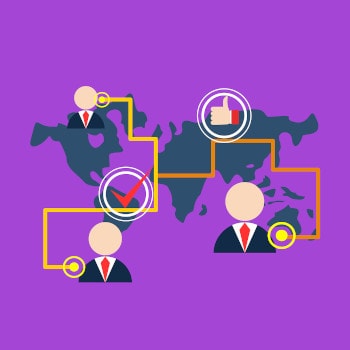
Working from home is still booming. This is why comprehensive protection against hacker attacks is so important for remote work.
Every data breach causes costs of over 4 million euros on average. It is therefore extremely important for companies to protect data against loss and theft, even when working remotely. Valentin Boussin, Country Manager Germany at the French secure conferencing specialist Tixeo, explains how remote work can be made more secure.
Target of attack: online communication
One of the popular targets for hackers to harvest data is corporate online communications. This is not surprising given that many companies rely heavily on video conferencing, but insufficiently protect it from cyber attacks.
A necessary step towards optimally protected online meetings is the use of a video conference provider with real end-to-end encryption. It is characteristic of them that the communication streams from client to client are encrypted and are not decrypted at any point. Communication is therefore also encrypted when it passes through the servers. This is important considering that in the absence of end-to-end encryption, the servers present a welcome security hole for hackers.
Target of attack: file sharing and file databases
With employees working from home, companies need to build file databases that all employees can access and tools for file sharing. However, file sharing and file databases pose significant risks, as cybercriminals can encrypt the entire amount of data by hacking a single user.
One way to prevent this scenario is to store the exchanged files in a cloud accessible through multi-factor authentication (MFA). With MFA, entering the correct password is not enough. Sometimes the person who wants to gain access has to identify themselves, for example by printing on a security sign that only employees of the company know.
Target of attack: Internet connection
Internet connection is another vulnerability that hackers like to target. If cybercriminals manage to get in here, they can access sensitive data. This risk is particularly prevalent with public Wi-Fi networks, e.g. B in hotels, train stations and cafés because their protection against cyber attacks is insufficient.
The use of VPN (Virtual Private Network) solutions can help. VPN adds a layer of encryption and authentication, guaranteeing protection and confidentiality of access to corporate resources. This solution is to be adapted to the user's profile and location. For example, a more robust VPN must be set up for employees who regularly work on the go than for employees who work from home.
Securing remote work invests in robustness
Securing remote work in your own company against hacker attacks cannot be achieved overnight. Cyber criminals are always on the lookout for vulnerabilities and can strike at any time. Achieving optimally protected corporate communications requires effort and is ultimately an investment in the robustness of the company.
Tixeo itself has been working 2015% remotely in a sensitive industry since 100. Based on this experience, the Tixeo software was equipped with features for remote collaboration that is not only highly secure, but also efficient and practical.
More at Tixeo.com
About Tixeo
Tixeo, headquartered in Montpellier, is the leading European company for secure video collaboration. Tixeo is the only video conferencing technology certified by ANSSI (French National Agency for Computer and Network Security) according to CSPN for its end-to-end encryption. This certification is recognized by the Federal Office for Information Security (BSI). Tixeo has been tested by numerous government agencies and certified with the label "Cybersecurity Made in Europe" and many others. This level of independent verification is unique and makes Tixeo the most secure virtual meeting software in the world.
Matching articles on the topic
